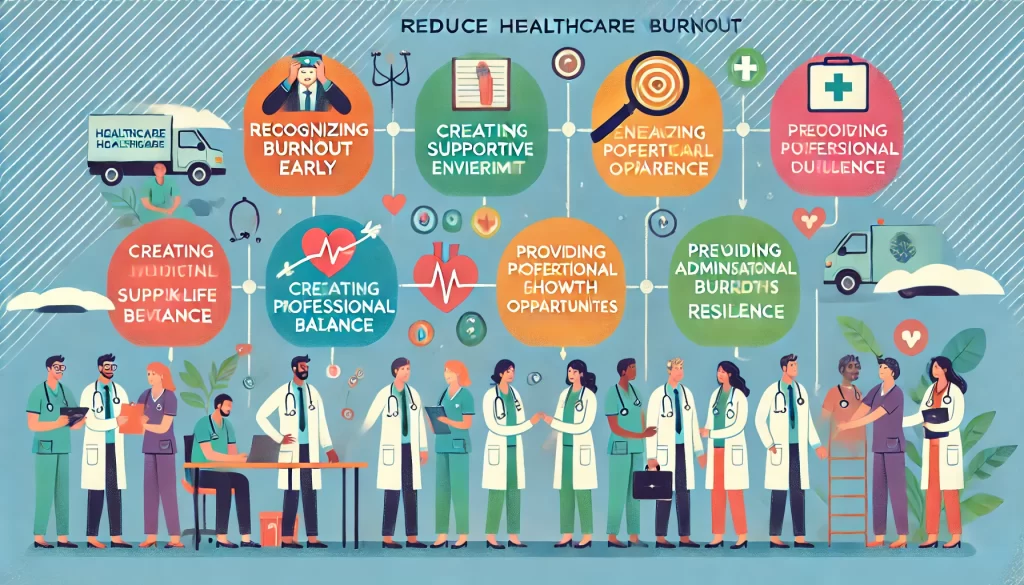The demands of the healthcare industry can place immense stress on its workers, leading to burnout that not only affects their well-being but also impacts patient care and organizational success. As healthcare leaders face ongoing challenges, it’s vital to take a proactive approach in supporting their workforce. By implementing key strategies, leaders can foster an environment that nurtures staff resilience and prevents burnout before it takes hold. Here are several approaches that can be integrated into any healthcare system to maintain a healthy, thriving workforce:

Recognize Burnout Early:
Burnout rarely happens overnight; it develops gradually, often manifesting through subtle changes in behavior and attitude. As a leader, it’s crucial to be vigilant for signs of burnout, such as emotional exhaustion, withdrawal from coworkers, irritability, or declining job performance. Leaders should prioritize regular check-ins, both formal and informal, with their staff. These conversations can provide insight into how employees are coping with their workloads and help spot early warning signs of burnout. Encouraging an open dialogue where healthcare professionals feel comfortable sharing their concerns is the first step toward offering the support they need. A culture that promotes psychological safety, where staff members can express feelings of being overwhelmed without fear of repercussion, is essential in early intervention efforts.
Create a Supportive Environment:
The culture within a healthcare organization can either alleviate or exacerbate the pressures that lead to burnout. Leaders should focus on fostering an environment where staff feel valued, supported, and part of a team working towards a common goal. Offering mental health resources, such as counseling services or stress management workshops, can provide much-needed support. Equally important is ensuring that workloads are distributed fairly to avoid overburdening specific individuals or departments. Recognition plays a key role in building a positive environment—small but regular acknowledgments of employee contributions can go a long way in boosting morale. Healthcare workers are more likely to feel motivated when they know their hard work is being appreciated. Building a supportive and collaborative workplace culture doesn’t just benefit individuals—it strengthens the entire organization.
Encourage Work-Life Balance:
Maintaining work-life balance in healthcare can be particularly challenging due to long shifts, frequent overtime, and the unpredictable nature of patient care. However, work-life balance is a crucial element in preventing burnout. Leaders can support their teams by offering flexible scheduling options where possible and ensuring that employees take their entitled time off without guilt. Encouraging staff to disconnect from work during their off hours is essential, as the continuous connection to the job can intensify burnout symptoms. Additionally, offering programs that promote wellness, such as yoga or mindfulness sessions, can help healthcare workers manage stress and achieve a healthier balance between their personal and professional lives. When staff have time to recharge outside of work, they’re more engaged and effective in their roles, and the quality of patient care improves.
Professional Growth Opportunities:
Healthcare professionals are often driven by a desire to learn and grow within their careers. Leaders can help prevent burnout by ensuring that employees have access to continuous education, career development programs, and opportunities for advancement. Offering professional growth opportunities keeps staff motivated, giving them a sense of progression and purpose in their roles. Whether through workshops, certifications, or mentorship programs, investing in your staff’s career development not only increases job satisfaction but also reduces feelings of stagnation, which can contribute to burnout. Furthermore, it sends a message that the organization is committed to long-term employee success, which enhances loyalty and reduces turnover.
Prioritize Mental Health and Resilience:
Mental health support is critical in the healthcare industry, particularly after global health crises like the COVID-19 pandemic that placed unprecedented strain on the workforce. Leaders must take a proactive stance by offering comprehensive mental health resources and prioritizing resilience-building. Peer support groups, where healthcare professionals can share their experiences and provide mutual support, can be particularly effective in fostering emotional resilience. Regular workshops focusing on stress management techniques, coping strategies, and mindfulness practices can help healthcare workers build their resilience to handle ongoing challenges. Mental health should be destigmatized within the organization, with leaders encouraging staff to seek help when needed and emphasizing that it is not a sign of weakness but a path to sustainability.
Reduce Administrative Burdens:
A significant cause of stress and burnout for healthcare professionals is the sheer volume of administrative tasks that take away from their primary focus: patient care. Whether it’s filling out endless forms or managing electronic health records, administrative burdens can become overwhelming. Leaders can help alleviate this stress by investing in technology that automates repetitive tasks and simplifies workflows. This might include advanced electronic health record systems, AI-driven solutions for managing paperwork, or even hiring administrative staff dedicated to handling the non-clinical side of care. By streamlining administrative processes, healthcare workers can spend more time focusing on what they do best—caring for patients. Not only does this increase job satisfaction, but it also improves patient outcomes.
Incorporating these strategies can create a workplace where healthcare professionals feel supported, motivated, and resilient, reducing the risk of burnout and ensuring high-quality patient care. Leadership in healthcare goes beyond managing resources—it involves cultivating an environment where staff can thrive both personally and professionally.
